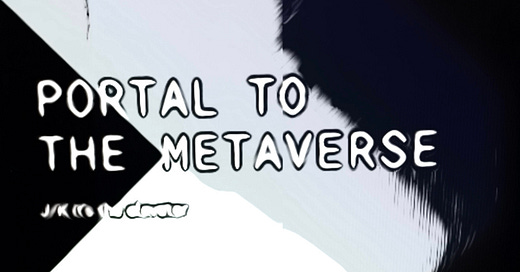Having last been to Austin several years ago, I was really excited to catch up with friends and learn a few things during SXSW.
A year ago I did a virtual talk, which, I was told, went well. But in cyberspace, no one can hear you applaud and it left me wanting more. Being back to an all-out in-person conference was deeply satisfying. An actual face-to-face discussion with reams of people was a welcome jolt. I’ve missed it.
During the preparation for my talk, the organizers told me that gaming had become a focus. That it had been moved to the first weekend to align it with the big tech and ad brands and bring it extra attention. Woo boy, did that work. The place was packed! For all the years that I’ve been covering video games, I have never seen such a turnout that consisted largely of people from outside of interactive entertainment.
As for major themes, there were two.
The first was, predictably, the metaverse and the unflinching enthusiasm that currently surrounds it. Never mind that its development started 15 years ago when multiplayer online environments became popular. And what to make of the all-male cast of metaverse architects?
From posters to panel titles, the metaverse was everywhere. Sure enough, Reggie had a few things to say about it, but by and large, people seemed to agree we’re just months away from resolving humanity’s issues with a single, shiny new technology. To many, the inevitability of its full potential is so strong that they are already borrowing against its future. It’s good, I suppose, that we’re collectively looking in the same direction. Things do tend to change when we work together. But in order to move society, business, and politics forward in a constructive way, we still have to solve our existing problems. Inequality, lack of diversity, and similarly large challenges need to be addressed in the present. No amount of futurism is going to help with that.
The second, blockchain, was equally pervasive. Notably, Meta announced that NFTs are coming to Instagram. The deep pockets of the different crypto foundations sponsored a slew of lavish parties. After spending a few years stuck in-doors, it is clear that crypto is funding the roaring 2022s. DJs, rooftop parties, open bars, and a never-ending stream of finger foods offer a sight I hadn’t seen since the dotcom boom.
It triggers some immediate questions, of course. Is this the way forward? Are we building false expectations? And, is it really going to be a host of recent college grads that will lead the future of digital finance and non-fungible collectibles? We’ll see.
What balanced all that digital gobbledygook out was Austin’s buzzing nightlife. On Saturday night I went to more concerts than I had been even in a pre-pandemic year. It was a welcome reprieve and effective antidote to the intoxicating hype. SXSW was a wonderful glimpse into the future. But now that I’m back in the present I have my work cut out for me.
On to this week’s update.
NEWS
Warner Bros. plans to release comic book-based NFTs
It looks like IP holders are picking up the pace in adopting blockchain. After Warner Music Group announced a collaboration with Splinterlands, now its consumer product division has partnered with Cartamundi, a maker of card and board games. Offering a hybrid between physical and digital cards, the partnership aims to provide “a deeper fan experience.”
My take is that Cartamundi paid a generous minimum guarantee to obtain the license and expand its capabilities to include the creation of digital collectibles. I previously outlined how the overall market for collectibles has more than doubled to $5.1 billion since 2016. We can expect more conventional board game and toymakers to develop digital capabilities as license holders pursue newly afforded revenue streams.
In effect, we’re witnessing the start of the next digitalization phase in which existing properties are digitized and distributed via new channels. A decade ago, large game publishers slowly rolled out fully downloadable versions of their titles for digital distribution. The more interesting phase begins once creative firms start integrating new affordances and move beyond producing horseless carriages.
Saudi sovereign wealth fund inserts coin, presses start
This week the Saudi-Arabia Public Investment Fund (PIF) purchased a 2.6% stake in NCSoft, one of South Korea's leading game makers.
According to a regulatory filing submitted on March 10, the fund acquired a total of 563,566 shares of NCSoft through six transactions in early February, totaling $240 million, making it the second-largest shareholder after the firm’s founder. It also bought an additional 1.1 percent stake in Nexon, one of NCSoft’s rivals. In a relatively short period, PIF has amassed a total of $8.6 billion in combined holdings in video game shares. After initially buying about $300 million worth of shares in Square Enix in December 2020, the fund took positions in North America’s largest publishers: Activision Blizzard, Electronic Arts, and Take-Two Interactive late last year.
With the purchase of shares in Koei Tecmo, Capcom, and their South Korean counterparts at the start of 2022, PIF holds about $3.2 billion in Asia-based game publishers. It should be noted that NCSoft and Nexon are slight outliers as the fund bought a greater slice of the total outstanding shares, namely 9.3% and 7.2%, respectively, compared to an average of 5.8%.
In addition, PIF also owns both ESL Gaming and FaceIt which it acquired last month for $1.05 billion and $450 million via its subsidiary Savvy Gaming Group. The sudden acceleration in buying up video game companies echoes the push by the South Korean government to stimulate economic growth by developing high-tech industries. Others have also pointed toward the string of acquisitions as a way for the Saudis to showcase their increasing technological strength.
The Middle East and North Africa, or MENA, have long been undeveloped gaming markets, but that is clearly starting to change. According to a recent report by Niko Partners (disclosure: I’m an advisor), Saudi Arabia is the “gaming powerhouse of Arabic speaking nations” in the region. The three largest consumer markets there, Saudi Arabia, The United Arab Emirates, and Egypt, have a combined gaming audience of 65 million people. In 2021, consumers spent a total of $1.8 billion, which Niko Partners expects to almost double by 2025.
Unpopular opinion: Thatgamecompany needs to grow up
I’ll start by stating the obvious: Journey was amazing. It was a beautiful and deeply emotional experience. Despite being a relatively short game, it was well worth the $15 I paid for it at the time.
Next, Flower was gorgeous and similarly innovative. Where other titles were trying to push me into increasingly narrow spaces and force me to deal with the minutia of my loadout and how quickly I can twitch a crosshair across my screen, Flower gave me breadth. Few games have managed to move me as these two.
It makes sense that thatgamecompany would release a comparable title for mobile. It is, after all, the biggest platform. But after spending a few hours playing its Sky: Children of the Light on my iPhone, I get the feeling Jenova Chen thinks I’ve never played a game before.
At its most basic, the experience is maddening. I jump around a bit and am served a cut-scene. Ok, cool. Some more walking. More cut-scene. Walk. Stop. Walk. Wait. More instructions. I mean, come on.
Before you point out that it’s not about rushing the game and that the journey is the most important, I’m 100% with you. But I’m traveling through a universe that treats me like it’s my first rodeo. I’ve been on economy flights where I have fewer orders barked at me. Just because you’re making games for mainstream audiences, doesn’t mean you don’t have to talk down like that. Where, for instance, is the option to turn off the intrusive instructions? The beautiful vistas and delicate music suffer immensely when I also have to stare at some helpful hint the entire time. Your uncheckable need to mansplain is ruining what could be the closest thing to grace the mobile games industry has yet produced.
Largest Addressable Baby
What should be no more than poor design seems, unfortunately, to be the manifestation of a rather tiring philosophy: Jenova Chen’s perception of humans. In an interview with the Verge, he stated:
“The reality is: human beings, unfortunately, are giant babies in the virtual world. No matter how old you are, even if you’re in your 70s, if we move you from Earth and into a virtual space, [that person] would become a giant baby. A baby doesn’t know what is a good moral value versus what is a bad moral value. The baby only knows: if I’m in a new environment, I’m going to try to push the buttons and see what kind of feedback I can get, and babies are great at looking for maximum feedback.”
What an aggravating, arrogant thing to say. Despite being capable of making incredibly beautiful worlds, he holds an equally ugly perspective on the people that populate them. According to the article, he arrived at this insight with the help of a child psychologist. Imagine what could have been if he instead had employed an adult psychologist.
More so, the firm’s minimalist design that made it famous necessarily reduces all human interaction to near zero. It leaves absolutely no room for anyone to step outside of Mr. Chen’s firmly defined boundaries. All that players have left is in fact pressing the buttons and seeing what feedback you get. There isn’t anything else. “Follow the Spirit to relive its memories.” “When lost tap yourself.” Tap this to do that. Tap on this other thing, you big idiot baby.
What Sky suggests to me is that celebrated creative talent in video games runs the risk of becoming disconnected. Such sterallures, a Dutch term that describes ambitious pretentiousness, threaten the integrity of the art form. Despite the brilliance of Minecraft, it took only a handful of tweets for Notch to self-destruct. And Zuckerberg’s $2 billion bet on virtual reality so far merely funded wunderkind Palmer Luckey’s insatiable curiosity for terrifying military hardware. They make Kanye West seem reasonable. The abundance of capital and the industry’s current hay day inadvertently elevates some game designers to new levels of celebrity. And good for them. But in the process, they risk losing their humanity.
Unfortunately, that puts them in the company of well-known tech bros from the Bay Area whose accomplishments in building and selling nouveau tech somehow also validates their opinions about everything else. Twitter’s founder Jack Dorsey deliberately played absentee landlord on his platform as it polarized the political climate. Marc Zuckerberg sees no evil, hears no evil, but for the interesting problems only he can solve.
Artists in any industry necessarily have to evolve with their audience. What made Zelda: Breath of the Wild so powerful wasn’t the open-world design but the fact that, like me, it had matured. The same can be said of a franchise like Doom which became richer and more complex as it aged. What thatgamecompany offers is a regression. I don’t need to be told repeatedly how to jump or to follow the little glowy light. You can trust my abilities and level of digital literacy. I know how to do this. Since your last game, I’ve grown up. Have you?
PLAY/PASS
Pass. Hate raids on Twitch.
Play. After playing Hellblade: Senua's Sacrifice, which deals with mental health problems, I’m excited to see a broader application of games that help people heal.







